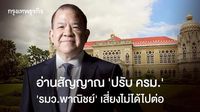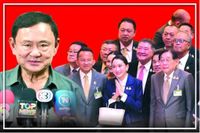In a significant political development, Prime Minister Phatthongtharn Shinawatra has successfully navigated a no-confidence debate, receiving a strong vote of confidence from the House of Representatives. On March 26, 2025, the assembly voted 319 to 162 in favor of the Prime Minister, reflecting a robust coalition government that has managed to maintain unity despite challenges. This outcome not only reassures Shinawatra's leadership but also indicates a stable political landscape leading up to the 2027 elections.
The vote of confidence comes as a relief to Thaksin Shinawatra, the former Prime Minister and father of Phatthongtharn, who played a crucial role in her ascent to the premiership. Following the political upheaval that led to the resignation of her predecessor, Phatthongtharn's successful defense against the no-confidence motion demonstrates her capability to lead effectively.
Despite the overwhelming support, the debate was not without controversy. The opposition raised serious allegations regarding the Prime Minister's financial dealings, particularly concerning a loan related to family shares worth over 4 billion baht. Wirot Lakkhanaadisorn, a member of the Move Forward Party, questioned whether this maneuver was a “technical trick” to evade taxes, highlighting the need for a thorough investigation into potential tax loopholes.
In the aftermath of the debate, the coalition government is now focusing on key legislative initiatives. The Cabinet has already approved a draft law for entertainment complexes, signaling a proactive approach to economic revitalization. This move has garnered support from coalition partners, including the Bhumjaithai Party, which had previously expressed concerns over the deal.
However, the political landscape remains fraught with challenges. The coalition's unity will be tested as various parties vie for influence and positions within the government. The possibility of a Cabinet reshuffle looms, with speculations surrounding the future of Commerce Minister Phichai Naripthaphan, whose performance has come under scrutiny. Critics have pointed to his frequent overseas trips and lack of engagement with party members as indicators of his unsuitability for the role.
During the no-confidence debate, opposition members highlighted issues such as falling agricultural prices and the government's handling of economic policies. Phichai defended his ministry's efforts, stating that the government is committed to addressing farmer concerns and improving economic conditions. Nonetheless, the opposition remains skeptical, arguing that the government's responses have been inadequate.
As the government seeks to solidify its position, internal dynamics within the coalition could lead to friction. The recent vote of confidence may have temporarily quelled dissent, but the potential for future disputes remains. The Bhumjaithai Party, for instance, has expressed a desire for greater influence in the Cabinet, particularly regarding the Ministry of Interior, which is crucial for the upcoming elections.
Moreover, the political maneuvering extends beyond the coalition. The opposition parties are also strategizing for the future, with an eye on the next election cycle. The political landscape is evolving, and both the government and opposition will need to adapt to the changing dynamics to secure their positions.
In a related development, hospitals in Thailand have begun to adjust their services in response to a recent earthquake in Myanmar that also affected parts of Bangkok. Chulalongkorn Hospital, Rama Hospital, and Siriraj Hospital announced the suspension of non-emergency services and outpatient clinics as a precautionary measure against potential aftershocks.
Chulalongkorn Hospital confirmed that it would close its outpatient services on March 28 and 29, citing safety concerns for patients and staff. Similarly, Siriraj Hospital has halted all non-urgent surgeries and outpatient services during this period. Hospital officials emphasized that inpatient care would continue as normal, and updates would be provided as the situation develops.
The earthquake, which struck on March 28, prompted immediate responses from healthcare facilities to ensure the safety of patients and staff. The National Cancer Institute has also launched initiatives to enhance access to healthcare services, particularly for cancer screenings, as part of ongoing public health efforts.
As the political and health landscapes in Thailand evolve, the implications of recent events will likely resonate in the months to come. The government's ability to maintain stability and address pressing issues will be crucial, especially with the 2027 elections on the horizon.
In conclusion, Prime Minister Phatthongtharn's recent political triumph reflects both the strengths and vulnerabilities of her administration. With pressing economic challenges and potential internal disputes looming, the coming months will be critical for the coalition government as it seeks to navigate the complexities of Thai politics while ensuring the welfare of its citizens.







